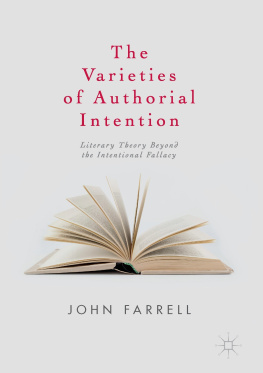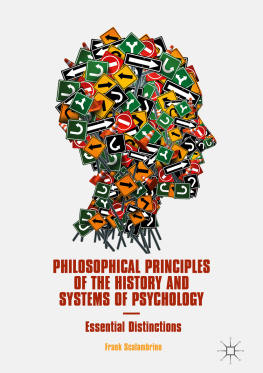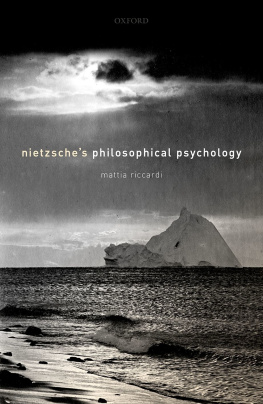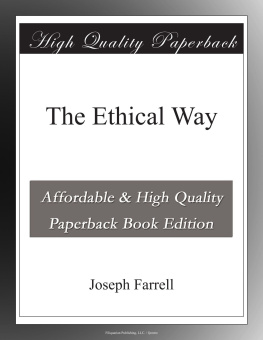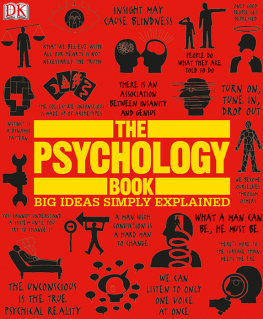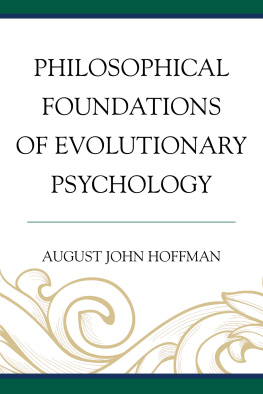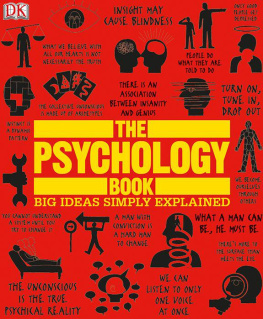Farrell - Historical and Philosophical Foundations of Psychology
Here you can read online Farrell - Historical and Philosophical Foundations of Psychology full text of the book (entire story) in english for free. Download pdf and epub, get meaning, cover and reviews about this ebook. year: 2014, publisher: Cambridge Univ Pr, genre: Romance novel. Description of the work, (preface) as well as reviews are available. Best literature library LitArk.com created for fans of good reading and offers a wide selection of genres:
Romance novel
Science fiction
Adventure
Detective
Science
History
Home and family
Prose
Art
Politics
Computer
Non-fiction
Religion
Business
Children
Humor
Choose a favorite category and find really read worthwhile books. Enjoy immersion in the world of imagination, feel the emotions of the characters or learn something new for yourself, make an fascinating discovery.
- Book:Historical and Philosophical Foundations of Psychology
- Author:
- Publisher:Cambridge Univ Pr
- Genre:
- Year:2014
- Rating:5 / 5
- Favourites:Add to favourites
- Your mark:
- 100
- 1
- 2
- 3
- 4
- 5
Historical and Philosophical Foundations of Psychology: summary, description and annotation
We offer to read an annotation, description, summary or preface (depends on what the author of the book "Historical and Philosophical Foundations of Psychology" wrote himself). If you haven't found the necessary information about the book — write in the comments, we will try to find it.
Historical and Philosophical Foundations of Psychology — read online for free the complete book (whole text) full work
Below is the text of the book, divided by pages. System saving the place of the last page read, allows you to conveniently read the book "Historical and Philosophical Foundations of Psychology" online for free, without having to search again every time where you left off. Put a bookmark, and you can go to the page where you finished reading at any time.
Font size:
Interval:
Bookmark:

This textbook connects the big ideas and key thinkers of psychology and philosophy in a clear and cohesive theoretical narrative. Students are led to understand the relations between different schools of thought, and to connect the various thinkers, theories and facts in psychologys history. Focusing on the major ideas that have reoccurred throughout history, such as the mindbody problem and the role of the mind in our experience, Martin Farrell shows how specific thinkers have explored the same ideas, but in different ways, leading to distinct schools of thought. The coherent narrative enables students to see the bigger picture, through which the historical and conceptual roots of psychology can be easily understood.
MARTIN FARRELL is an Honorary Lecturer in the School of Psychological Sciences at the University of Manchester. With over 15 years experience of teaching psychology, he has lectured on many aspects of the discipline but his main focus has always been on the interface between psychology and philosophy. He has lectured on the history of psychology for more than 10 years and on consciousness for 13 years, and has taught philosophy of science to postgraduate students for six years. This book is the fruit of this accumulated experience.


For Donna
And my mother and father
The sheer amount of information available to todays psychology student, and the ease with which that information can be obtained, is greater than it has ever been in the past. Though this is no doubt a blessing, it is not without its dangers. In particular, it is easy for the student to become bogged down in a mass of facts and details with little appreciation of how everything fits together. Knowing disjointed facts, no matter how vast that knowledge may be, does not constitute understanding. It is only when that knowledge is embedded within an overarching framework that understanding occurs. Knowledge of the historical and philosophical foundations of psychology provides such a framework.
But in order to achieve this, the historical and philosophical foundations of psychology cannot themselves be presented in a bitty and disjointed fashion. There must be some sort of narrative, not just a bunch of ideas and theories. There must be an indication of how ideas fit together, and of the pervasive influence of certain core ideas that resurface at various points throughout the history of psychology. That is what I have tried to do in this book.
This book grew out of a course on the history and philosophy of psychology that I taught at the University of Manchester. In preparing the course I had difficulty in finding a book that tied together the ideas and theories in quite the way I wanted. I felt that many of the available textbooks were repositories of factual information useful factual information, no doubt but that they did not present a coherent narrative. I also thought that there was a tendency to try to cover too much ground, too many thinkers, and that, as a result, the treatment of them was often a little cursory. My goal, then, was to provide more of a coherent narrative, and to discuss the ideas presented in greater depth.
The book is perhaps more selective than some others on the history and philosophy of psychology. I make no claims to its being comprehensive nearly everyone will be able to point out some favourite psychologist or philosopher who has not been included or has not been given enough attention. But I thought it better to look in more detail at the work of a smaller selection of thinkers than to deal superficially with a large number of thinkers. It is also the case that concentrating on a smaller number of thinkers makes it easier to grasp the interconnections between their ideas than if one were to try to cover everyone of importance. I believe that, after having read this book, students will be equipped to locate the ideas of other thinkers not discussed in the book within the general framework that it provides.
The narrative presented in this book is, then, not the only story that could be told about the historical and philosophical foundations of psychology. It does, however, deal with what I believe to be some of the most important and recurring problems and issues concerning the foundations of psychology issues such as the mindbody problem, the extent to which the mind itself constructs our experience, and the extent to which mental processes can be understood as being purely internal to the organism or essentially connected to the environment. These fundamental issues, and others like them, reappear throughout the book. These issues are discussed in relation to the thought of major philosophers, such as Descartes, Locke, Hume, and Kant, as well as the ideas of influential psychologists, such as William James and Wilhelm Wundt, and psychological movements, such as Gestalt psychology and behaviourism.
The book is organised in a roughly chronological order. It is sometimes the case that books on the history of ideas are organised around themes, but a chronological presentation seemed to me to be the most natural one for providing the narrative that I desired.
The book, as mentioned above, grew out of my undergraduate teaching, and so is aimed at undergraduate psychology students, though I hope that postgraduate students would also find something of value in it. I have tried to write the book as clearly as possible, but it is inevitable that some technical terms will feature in the text. Where these occur, they are printed in bold and are defined in a glossary at the end of the book.
Font size:
Interval:
Bookmark:
Similar books «Historical and Philosophical Foundations of Psychology»
Look at similar books to Historical and Philosophical Foundations of Psychology. We have selected literature similar in name and meaning in the hope of providing readers with more options to find new, interesting, not yet read works.
Discussion, reviews of the book Historical and Philosophical Foundations of Psychology and just readers' own opinions. Leave your comments, write what you think about the work, its meaning or the main characters. Specify what exactly you liked and what you didn't like, and why you think so.




